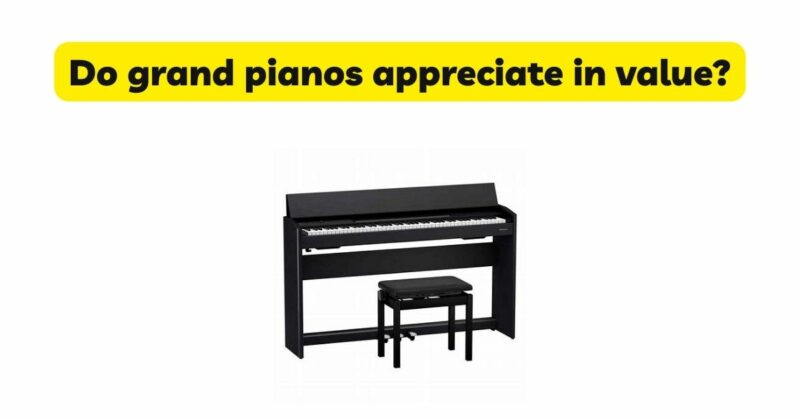Grand pianos have long been regarded as not only musical instruments but also objects of aesthetic beauty and craftsmanship. Beyond their artistic and musical value, there is a common belief that grand pianos can appreciate in value over time, making them potential investments. In this article, we explore the factors that contribute to the appreciation potential of grand pianos, including brand reputation, craftsmanship, age, condition, historical significance, and market demand. By examining these elements, we aim to provide insights into the investment value of grand pianos, helping individuals make informed decisions when considering the purchase of a grand piano as a potential asset.
- Brand Reputation: The reputation of the piano brand plays a significant role in the potential appreciation of a grand piano. Well-established and renowned brands with a history of producing high-quality instruments are more likely to maintain their value and appreciate over time. Brands such as Steinway & Sons, Bösendorfer, and Yamaha have gained worldwide recognition for their craftsmanship and musical excellence, making their grand pianos sought after in the market. The prestige associated with these brands contributes to the investment value of their instruments.
- Craftsmanship and Materials: The level of craftsmanship and the quality of materials used in the construction of a grand piano can influence its potential for appreciation. Handcrafted grand pianos, made with meticulous attention to detail and using premium materials, are more likely to hold their value and appreciate over time. Fine woods, such as solid spruce soundboards and high-quality hardwoods for the cabinet, contribute to the longevity and aesthetic appeal of the instrument. Pianos that showcase exceptional craftsmanship and attention to detail are highly valued by collectors and enthusiasts, which can contribute to their appreciation potential.
- Age and Historical Significance: The age and historical significance of a grand piano can also impact its investment value. Antique or vintage grand pianos, particularly those with historical provenance or associated with renowned musicians or composers, often hold a special allure for collectors and music enthusiasts. These instruments can be viewed as valuable artifacts and may appreciate in value due to their rarity and historical significance. However, it is worth noting that not all older grand pianos appreciate in value, as factors such as condition and market demand also play a crucial role.
- Condition: The condition of a grand piano is a significant determinant of its investment value. Well-maintained pianos, with regular tuning, proper care, and any necessary repairs or restorations, are more likely to hold their value and appreciate over time. A piano in excellent playing condition, with minimal wear and tear, will attract greater interest from potential buyers or collectors. Conversely, pianos in poor condition or in need of significant repairs may not appreciate in value and may require additional investments to restore their market appeal.
- Market Demand: The demand for grand pianos in the market influences their potential for appreciation. Factors such as popularity, current trends, and the preferences of buyers and collectors can impact the value trajectory of grand pianos. Instruments that are highly sought after by professional musicians, recording studios, or prestigious venues are more likely to appreciate in value due to their desirability. Additionally, the global market demand for grand pianos, which can fluctuate over time, can also influence the investment potential of these instruments.
- Rarity and Uniqueness: The rarity and uniqueness of a grand piano can contribute to its investment value. Limited edition or custom-made grand pianos, with distinctive features or design elements, often attract collectors and enthusiasts who are willing to pay a premium for these unique instruments. Uniqueness can arise from factors such as specialized finishes, innovative engineering, or collaborations with renowned artists or designers. The scarcity of such instruments can drive up their value over time, offering the potential for appreciation.
Conclusion: While it is true that certain grand pianos have appreciated in value over the years, predicting the future investment value of any specific instrument is challenging and subject to various factors. Factors such as brand reputation, craftsmanship, age, condition, historical significance, market demand, rarity, and uniqueness collectively contribute to the investment potential of grand pianos. It is essential to conduct thorough research, consult experts, and consider personal preferences and financial goals when purchasing a grand piano as a potential investment. Ultimately, the enjoyment of playing and owning a grand piano should be the primary consideration, with any potential appreciation in value being an additional benefit.


